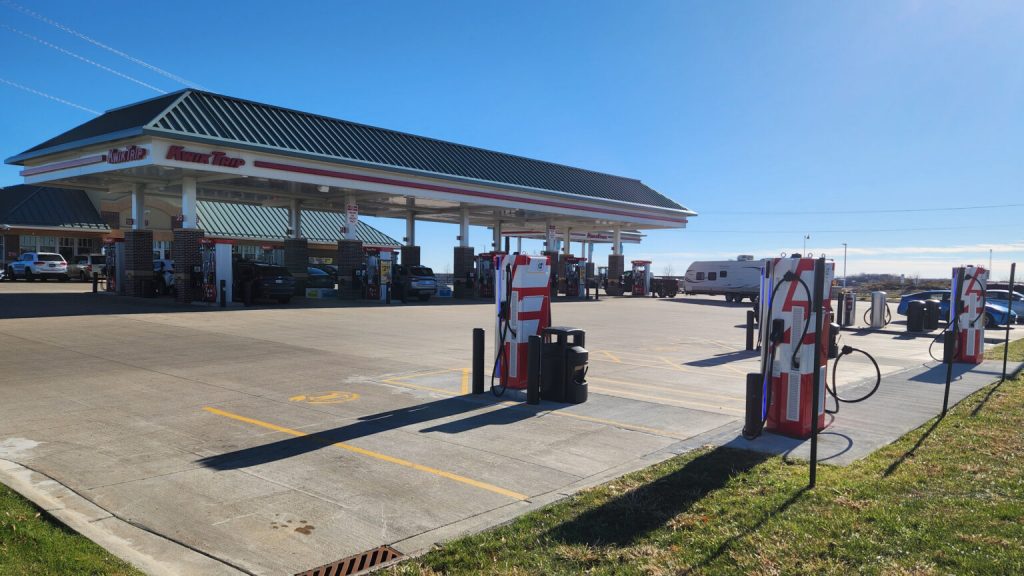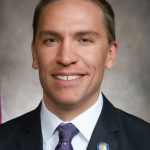Wisconsin Recharges Electric Vehicle Project
$14 million for 26 charging stations, after successful suit against Trump Administration.

A Kwik Trip station in Mount Horeb, Wisconsin, was among the locations chosen for new charging stations in the first round of Wisconsin’s build-out for its charging station network under the National Electric Vehicle Infrastructure program (NEVI), part of the bipartisan infrastructure law enacted during President Joe Biden’s term in office. (Photo by Erik Gunn/Wisconsin Examiner)
A program to expand electric vehicle charging stations in Wisconsin is getting a $14 million jolt with plans to build 26 more stations across the state.
Gov. Tony Evers and the Wisconsin Department of Transportation announced the expansion plan Monday.
The announcement recharges the state’s electrical vehicle charging network project, supported by the National Electric Vehicle Infrastructure program. NEVI, part of the 2021 bipartisan infrastructure law signed by then-President Joe Biden, provides grants to states to build more charging stations.
“Transportation is evolving, and departments of transportation and states have to adapt with that evolution,” said John DesRivieres, WisDOT’s communications director. “As the market and the number of folks who are driving electric vehicles grows, EV infrastructure is needed.”
NEVI funding paused after President Donald Trump took office, and Wisconsin was one of 15 states along with the District of Columbia to sue the Trump administration in May for cutting off money for the program. A federal judge blocked the administration in June from defunding NEVI, and the Wisconsin DOT subsequently restarted its program.
The $14 million in federal funds for Wisconsin’s new round of charging stations will go to projects in communities throughout the state, from Superior in the northwest to East Troy in the southeast. They include 11 locations at Kwik Trip service stations, six locations at hotels or resorts, six locations at other service station brands and a handful of other businesses.
“My administration and I have prioritized ensuring our state’s infrastructure meets the needs of the 21st Century since Day One because expanding our clean energy and electric vehicle infrastructure helps create jobs and bolster our economy, and it’s good for our planet, too,” Evers said. “Thanks to our actions to get the Trump Administration to release this critical funding that they were illegally withholding, we are thrilled to see the NEVI program continue to support these goals and further move us toward the clean energy future Wisconsinites deserve.”
The transportation department chose projects based on their location, their potential for future development, and the business site’s hours. Extended hours were given preference to accommodate longer refueling times, according to WisDOT.
Wisconsin’s plan calls for charging stations along 15 major interstate, U.S. and state highway corridors that cross the state. A WisDOT EV charging station dashboard shows the locations for all planned chargers in the state.
With the round of grants announced Monday, Wisconsin has invested a total of $36.4 million in federal funds for 78 projects.
The first round, announced in May 2024, invested $22.4 million to build 52 stations. Of those, 11 are operational, 16 have been authorized for construction and the rest are in pre-construction phases.
A federal tax credit for electric vehicles that was included in the 2022 Inflation Reduction Act abruptly ended, effective Sept. 30, under the Republican tax-cut and spending mega-bill enacted in July.
“There are already 37,000 EVs on the road today, and we saw that number spike as people raced to purchase EVs before the federal tax credit expired,” said Alex Beld, communications director for Renew Wisconsin, a nonprofit that promotes policies and programs to expand solar, wind and hydropower along with building electrification, energy storage and electric vehicles.
“By expanding our network of charging stations, we hope to see that number continue to climb,” Beld said. “Through this transition away from gas-powered vehicles, we can reduce emissions and support our state’s economy.”
An analysis by SRI International published in 2023 for the Wisconsin Economic Development Corp. concluded that “there is a tremendous opportunity for Wisconsin to develop a globally competitive cluster centered on the manufacturing of EVs and EV-related equipment, which in turn can help revitalize Wisconsin’s automotive manufacturing industry and drive statewide economic development.”
Beld said that jobs related to clean energy grew four times faster than the rest of Wisconsin’s economy in 2024.
“If this funding had been clawed back permanently, I think we would have still seen progress,” Beld said. “It would have certainly been slower and would have likely cost the state jobs.”
Wisconsin restarts electric vehicle project with $14 million for 26 charging stations was originally published by the Wisconsin Examiner.
Transportation
-
Congestion Pricing Cuts Air Pollution in New York City
 Dec 14th, 2025 by Jeff Wood
Dec 14th, 2025 by Jeff Wood
-
FTA Tells Milwaukee to Crack Down on Fare Evasion — Even Where Fares Don’t Exist
 Dec 12th, 2025 by Graham Kilmer
Dec 12th, 2025 by Graham Kilmer
-
Will GOGO’s Bus Service Ever Get Going?
 Dec 9th, 2025 by Jeramey Jannene
Dec 9th, 2025 by Jeramey Jannene






















we need clean energy to help us breathe